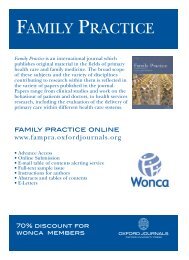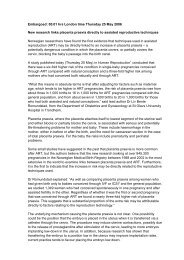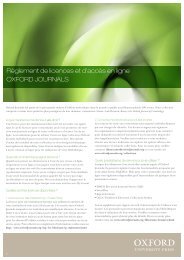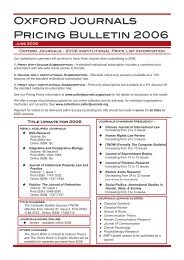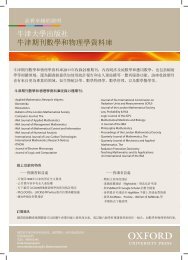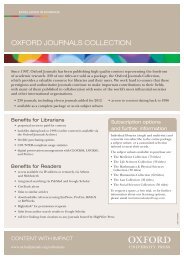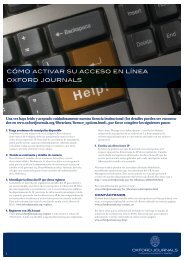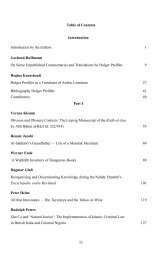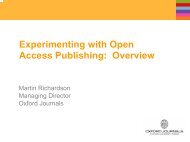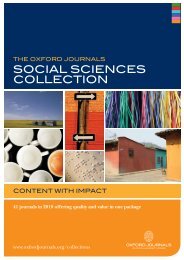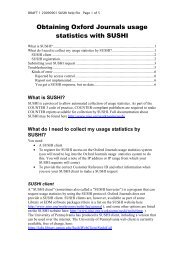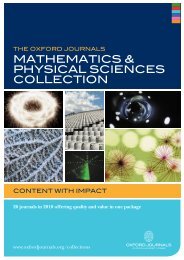Download the ESMO 2012 Abstract Book - Oxford Journals
Download the ESMO 2012 Abstract Book - Oxford Journals
Download the ESMO 2012 Abstract Book - Oxford Journals
You also want an ePaper? Increase the reach of your titles
YUMPU automatically turns print PDFs into web optimized ePapers that Google loves.
1481PD A PHASE II STUDY OF DOVITINIB IN PATIENTS WITH<br />
METASTATIC OR UNRESECTABLE GASTROINTESTINAL<br />
STROMAL TUMORS AFTER FAILURE OF TWO OR MORE<br />
TYROSINE KINASE INHIBITORS<br />
Y. Kang 1 , M.H. Ryu 1 , J.J. Lee 2 , I. Park 1 , J.H. Park 3 , B. Ryoo 1<br />
1 Department of Oncology, Asan Medical Center, University of Ulsan College of<br />
Medicine, Seoul, KOREA, 2 Department of Nuclear Medicine, Asan Medical<br />
Center, University of Ulsan College of Medicine, Seoul, KOREA, 3 Department of<br />
Internal Medicine, Asan Medical Center, University of Ulsan College of Medicine,<br />
Seoul, KOREA<br />
Objectives: This prospective, phase 2 study evaluated <strong>the</strong> efficacy and safety of<br />
dovitinib in patients (pts) with advanced gastrointestinal stromal tumors (GISTs)<br />
who failed previous standard tyrosine kinase inhibitors (TKI).<br />
Methods: Thirty pts with pathologically proven metastatic or unresectable GIST who<br />
failed a minimum of both imatinib and sunitinib were accrued between Sep 2011<br />
and Apr <strong>2012</strong>. Dovitinib was administered orally at 500 mg qd for 5 consecutive days<br />
followed by a 2 day rest period.<br />
Results: The median age was 57.5 years (range, 35-76). All had metastatic disease in<br />
<strong>the</strong> peritoneum (n = 22), liver (n = 20), lung (n = 4), or bone (n = 4). Thirteen pts<br />
(43%) also failed nilotinib (n = 8), regorafenib (n = 2) or both nilotinib and<br />
regorafenib (n = 3) after failure of imatinib and sunitinib. By RECIST criteria, <strong>the</strong>re<br />
were no objective responses, 19 (63.3%) had stable disease (SD), 5 (16.7%)<br />
progressive disease (PD), and 6 (20.0%) were not evaluable. By EORTC PET criteria<br />
(at 4 weeks), 3 pts (10.0%) achieved a partial response, 15 (50.0%) had SD, 10 (33.3)<br />
showed PD, and 2 were not evaluable. With a median follow-up of 4.8 months<br />
(range, 0.8-7.5), <strong>the</strong> medi an progression-free survival (PFS) and overall survival were<br />
3.6 months (95% CI, 2.7-4.4) and 6.2 months (95% CI, 4.9-7.5), respectively. PFS<br />
could be predicted by PET response (PD vs no PD) at 4 weeks (p = 0.003). Grade 3<br />
or 4 adverse events of dovitinib with frequency > 5% pts included as<strong>the</strong>nia (16.7%),<br />
leucopenia (6.7%), thrombocytopenia (6.7%), and hypertension (6.7%). Those<br />
toxicities were manageable with dose modification, and <strong>the</strong>re were no<br />
treatment-related deaths.<br />
Conclusions: Dovitinib showed antitumor activity with manageable toxicities in this<br />
heavily pretreated cohort of GIST patients.<br />
Disclosure: Y. Kang: Honoraria, consultant, and research fund from Novartis. All<br />
o<strong>the</strong>r authors have declared no conflicts of interest.<br />
1482PD DASATINIB FIRST-LINE TREATMENT IN<br />
GASTROINTESTINAL STROMAL TUMORS. A MULTICENTER<br />
PHASE II TRIAL OF THE SAKK (SAKK 56/07)<br />
M. Montemurro 1 , J. Domont 2 , P. Rutkowski 3 , A.D. Roth 4 , R. von Moos 5 ,<br />
R. Inauen 6 , D. Dietrich 7 , C. Biaggi 8 , J. Prior 9 , S. Leyvraz 1<br />
1 Centre Pluridisciplinaire d’Oncologie, Centre Hospitalier Universitaire Vaudois -<br />
CHUV, Lausanne, SWITZERLAND, 2 Dept. Medical Oncology, Institut Gustave<br />
Roussy, VILLEJUIF, FRANCE, 3 Department of Soft Tissue/bone Sarcoma and<br />
Melanoma, Maria Sklodowska-Curie Memorial Cancer Center and Institute of<br />
Oncology, Warsaw, POLAND, 4 Oncology, University Hospitals of Geneva,<br />
Geneva, SWITZERLAND, 5 Medical Oncology, Kantonal Hospital Graubünden,<br />
Chur, SWITZERLAND, 6 Dept. of Oncology, Kantonsspital St. Gallen, St. Gallen,<br />
SWITZERLAND, 7 Statistics, Swiss Group for Clinical Cancer Research SAKK,<br />
Bern, SWITZERLAND, 8 Trial Coordination, Swiss Group for Clinical Cancer<br />
Research SAKK, Bern, SWITZERLAND, 9 Nuclear Medicine, University Hospital<br />
Lausanne CHUV, Lausanne, SWITZERLAND<br />
Introduction: First line imatinib has improved <strong>the</strong> outcome of patients (pts) with<br />
gastrointestinal stromal tumor (GIST), but primary and secondary resistance remain<br />
a problem. Dasatinib is a second generation tyrosine kinase inhibitor (TKI) of<br />
bcr-abl, src-family kinases and a number of o<strong>the</strong>r oncogenic kinases including kit.<br />
Dasatinib has shown activity against imatinib-resistant cell lines in vitro.<br />
18F-fluorodeoxyglucose positron-emission-tomography (FDG-PET) measures tumor<br />
metabolic activity for early response assessment, which might be of particular use in<br />
<strong>the</strong> clinical trial setting.<br />
Methods: This two-stage phase II trial investigated dasatinib in patients with<br />
histologically proven, FDG-PET positive, TKI-naïve GIST. Dasatinib starting dose<br />
was 2x70mg/day. Response evaluation was done by serial CT and FDG-PET using<br />
EORTC PET response criteria (Young et al. 1999). PET was reviewed centrally.<br />
Elective surgery was allowed after 6 months of trial treatment. Primary endpoint was<br />
response (CR + PR) by FDG-PET after one month of dasatinib.<br />
Results: 47 of planned 52 pts have been enrolled from December 2007 to November<br />
2011, when <strong>the</strong> trial was terminated due to slow accrual. 43 pts were eligible. Median<br />
age was 61 years, 24 pts were male, 19 female. 30 pts had a performance status of 0<br />
and thirteen of 1. Mutational data are available for 28 pts so far. 20 had a KIT exon<br />
11, one a KIT exon 9 mutation, and 7 were wild-type. At a median follow-up of 12.4<br />
Annals of Oncology<br />
months, 15 pts were still on treatment. Pts went off trial for elective surgery (n = 6),<br />
progression (n = 13), toxicity (n = 4), o<strong>the</strong>r reasons (n = 2) and three patients died.<br />
5% of pts experienced G4, and 38% of pts G3 toxicity, which were most often<br />
gastrointestinal or pulmonary. 28 pts had <strong>the</strong>ir dose reduced or interrupted. The<br />
primary endpoint, FDG-PET response rate (CR + PR) at 4 weeks was 72% (14 CR, 17<br />
PR, 7 SD, 3 PD, 2 not evaluable). The response rate in patients with a KIT Exon 11<br />
mutation was 80%, in wild-type patients 57%. Median progression-free survival is<br />
11.1 months and median overall survival not yet reached.<br />
Conclusions: Dasatinib shows promising efficacy in TKI-naïve pts with FDG-PET<br />
positive GIST.<br />
Disclosure: M. Montemurro: Speakers fees and travel grants - Bayer, Pfizer, Novartis.<br />
P. Rutkowski: Consultant - BMS, Novartis, MSD Speakers fees and travel grants -<br />
Novartis, Pfizer, MSD, BMS, Roche. R. von Moos: Consultant/Advisor - AMGEN,<br />
Novartis, Roche, BMS, Pfizer, Merck Speakers fees - Roche, Amgen institutional<br />
Research Funds - AMGEN Expert Testimony - AMGEN. All o<strong>the</strong>r authors have<br />
declared no conflicts of interest.<br />
1483PD INNO-206 IS AN ACTIVE DRUG FOR RELAPSED ADVANCED<br />
SOFT TISSUE SARCOMA<br />
S. Chawla 1 , V.S. Chua 1 , A. Hendifar 1 , D. Quon 1 , S. Negre 1 , K.N. Ganjoo 2 ,<br />
K. Sankhala 3 , Y. Lavinski 4 , S. Wieland 5 , D. Levitt 5<br />
1 Clinical Research, Sarcoma Oncology Center, Los Angeles, CA, UNITED<br />
STATES OF AMERICA, 2 Medical Oncology, Stanford University Medical School,<br />
Palo Alto, CA, UNITED STATES OF AMERICA, 3 Medical Oncology, University of<br />
Texas Health Science Center, San Antonio, TX, UNITED STATES OF AMERICA,<br />
4 Research, MutualHealth LLC, Newport Beach, CA, UNITED STATES OF<br />
AMERICA, 5 Clinical Development, CytRx Corporation, Los Angeles, CA, UNITED<br />
STATES OF AMERICA<br />
Background: We have studied <strong>the</strong> safety and tumor response of a doxorubicin<br />
conjugate, INNO-206, in patients with metastatic STS who progressed on prior<br />
chemo<strong>the</strong>rapy. INNO-206 is a conjugate of doxorubicin attached to an acid-sensitive<br />
linker that binds covalently to cysteine-34 in circulating albumin.<br />
Methods: INNO-206 was administered IV at 350 mg/m 2 (260 mg/m 2 dox. eq.) every<br />
21 days for up to 8 consecutive cycles. Tumor response was monitored every o<strong>the</strong>r<br />
month and treatment continued until tumor progression or unacceptable toxicity.<br />
Standard safety monitoring was performed and cardiac function was followed<br />
periodically using MUGA or cardiac ultrasound.<br />
Results: As of May 1, <strong>2012</strong>, 19 patients were entered in <strong>the</strong> study. 13/19 patients had<br />
STS of various types. Of <strong>the</strong> initial 19 patients treated at <strong>the</strong> 350 mg/m 2 dose, no<br />
individuals experienced a grade 3 or 4 non-hematological toxicity during Cycle<br />
1. The majority of patients demonstrated transient grade 3 or 4 neutropenias that<br />
resolved prior to <strong>the</strong> next cycle with and without G-CSF treatment. No patient<br />
exhibited relevant cardiotoxicity as determined by MUGA or cardiac ultrasound. Of<br />
19 patients, serious adverse events included febrile neutropenia (3) sepsis (1) and<br />
mucositis (1). Of <strong>the</strong> 13 patients with STS, 5 objective partial responses (3 of whom<br />
received prior doxorubicin) are ongoing as well as 7 patients with stable disease<br />
(median 6.43 months, range 1-10.7+ months). 1/13 patients had progressive disease<br />
at <strong>the</strong> first evaluation. 2/19 patients died with <strong>the</strong> first cycle (1 PD, 1 sepsis).<br />
Conclusion: INNO-206 is an active drug for <strong>the</strong> treatment of patients with advanced<br />
STS who have failed prior chemo<strong>the</strong>rapy. Cumulative doses of 2000 mg/m 2 of<br />
doxorubicin equivalents have been achieved, which is over 3½ x <strong>the</strong> peak cumulative<br />
dose of standard doxorubicin. Adverse events are primarily hematological and no<br />
cardiotoxicity has been observed.<br />
Disclosure: S. Chawla: Corporate sponsored research from CytRx Corporation.<br />
S. Wieland: Salary and stock ownership from CytRx Corporation. D. Levitt:<br />
Salaryand stockownership from CytRx Corporation. All o<strong>the</strong>r authors have declared<br />
no conflicts of interest.<br />
1484PD SELECTIVE INTERNAL RADIATION THERAPY (SIRT) FOR<br />
GIST LIVER METASTASES RESISTANT TO TYROSINE<br />
KINASE INHIBITORS<br />
P. Hohenberger 1 , N. Rathmann 2 , A. Peschel 2 , J. Schuette 3 , S.O. Schoenberg 2 ,<br />
D. Dinter 2 , S. Diehl 2<br />
1 Dept. of Surgery, UniversitaetsMedizin Mannheim, Mannheim, GERMANY,<br />
2 Dept. of Radiology and Nuclear Medicine, UniversitätsMedizin Mannheim,<br />
Mannheim, GERMANY, 3 Department of Oncology and Hematology,<br />
Schwerpunktpraxis Haematoonkologie Duesseldorf, Duesseldorf, GERMANY<br />
Background and aim: The liver is <strong>the</strong> typical location of metastases from<br />
gastrointestinal stromal tumors (GIST). Usually, metastases of GIST are treated by<br />
tyrosine kinase inhibitors (imatinib, sunitinib or o<strong>the</strong>rs). In patients with multiple<br />
metastases resistant to drugs and not amenable to surgical resection interventional<br />
ix480 | <strong>Abstract</strong>s Volume 23 | Supplement 9 | September <strong>2012</strong>



